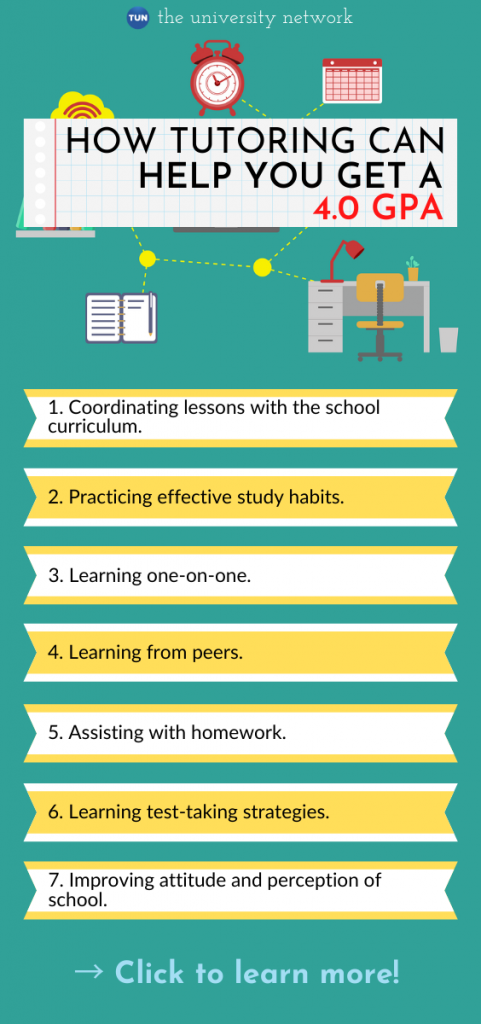Regular tutoring sessions can help students improve their grades in myriad ways. Many students receive occasional homework assistance or one-on-one tutoring, but few build it into their weekly schedule and are tutored on a regular basis.
Effective tutoring is more than just homework help. The best tutors are able to guide their students through the process of learning new information so that they develop problem-solving and thinking skills to succeed independent of tutoring.
Tutoring has been shown to have a significant impact on homework and testing grades, but it also can provide students with intangible benefits, such as a strong work ethic, a better attitude toward challenging subjects, and reduced testing anxiety.
Here’s how tutoring can help students improve their grades and performance in school.
Coordinating lessons with the school curriculum
One of the main advantages of having private tutoring is getting the opportunity to learn more than the standard course load. With private instruction, students can move ahead in the syllabus and begin working on concepts before the rest of their class does. Getting ahead of the syllabus better prepares students to comprehend difficult concepts when they come up. This will give students an advantage on exams and make it easier to keep up with their peers.
For students who aren’t ready to jump ahead in coursework, tutoring gives students the opportunity to work through concepts that they are struggling with, and can help reinforce those that they feel confident in.
Coordinating tutoring sessions with the school curriculum has been shown to help at-risk students learn and retain concepts. Students with a tendency to fall behind in class will often benefit from the focused guidance that they get in tutoring sessions.
Practicing effective study habits
Tutors not only help students with learning material but also can help students build effective study habits.
“The dictionary defines a tutor as a person who gives an individual, or in some cases a small group, instruction. I am not satisfied with the definition,” Halina Goetz, assistant professor of mathematics at Chapman University, wrote in a blog post. “I would add that the purpose of tutoring is to help students help themselves, and to assist or guide them to the point at which they become independent learners, and thus no longer need a tutor.”
In other words, a strong tutor will be able to provide their students with individualized attention as well as strong study habits and comprehension skills that can help students keep up with coursework and material even after they stop taking tutoring.
“Tutoring offers systematic, structured learning experience in a more individualized way,” she added. “It also improves the tutee’s self-esteem, attitude toward subject matter, and academic performance as well as personal growth. In addition to that, tutoring is a self-paced and self-directed learning process.”
There is some evidence that self-discipline — not advanced course material or tutoring — is the most important factor in education. A good tutor, however, will be able to teach students practice and develop skills related to self-discipline and work ethic. These skills can have an enduring effect on a student’s education, and even their post-educational success.
Learning one-on-one
The main advantage of receiving tutoring is the opportunity to consistently work one-on-one with their instructor. Individualized instruction allows students to hone in on areas of strength and weakness across subjects. Experienced tutors know how to work with various types of learners and can adapt their teaching style accordingly. This allows students to learn at a comfortable pace and spend additional time on areas where they struggle.
Various studies have shown that class sizes can raise student test scores and even improve student outcomes down the line. Even group tutoring can help students develop strong skills. In small groups and one-on-one sessions, the focused attention that a tutor can provide has its own advantages.
As Robert Slavin, director of the Center for Research and Reform in Education at Johns Hopkins University, noted in a blog post, “The tutoring session, whether one-to-one or one-to-very small group, gives students the undivided attention of a valued adult who can give them personal nurturing and attention to a degree that a teacher with 20-30 students cannot.”
A 2017 study of high school students in poor areas of Chicago showed that one-on-one math tutoring can have significant effects on students’ performance, resulting in higher test scores and grades in math, and fewer failures in math and non-math courses.
Learning from peers
Research-based tutoring methods have been shown to be particularly effective for helping students improve their grades and test scores, and tutoring by teachers and teaching assistants provides students with the most benefit. However, while volunteer tutoring is less effective, primarily due to volunteer programs facing difficulties in having volunteers every day, not all students have such direct access to trained tutors.
Fortunately, peer tutoring, in which students serve as tutors for other students, has been shown to have a positive impact on students of all ages.
One study conducted by doctoral candidates at the University of Arizona demonstrates that peer tutoring can provide various benefits to college students. The study, which followed students in a mathematics course at the university, found that peer tutoring had a significant impact on the students’ final examination scores, independent of gender, SAT score, math placement level, and high school GPA.
There is also evidence that tutoring at a young age can reduce the likelihood of special education referral and help prevent the development of a learning disability.
Assisting with homework
Helping with homework should never be the sole job of a tutor. Goetz noted that in conversations with students who have received tutoring, she found that “many, too many, parents and students equate a tutor with a ‘homework machine.’ ”
“The main goal of tutoring is to help a tutee to become a lifelong independent learner,” she elaborated. “Mimicking the steps shown by a tutor will not help a tutee become an independent learner and will not help the tutee learn critical thinking skills.
It is true that tutoring too often consists purely of homework help. However, assistance with homework can benefit many students who don’t receive assistance with homework from parents, siblings, or peers. Students who don’t receive help at home may struggle compared to peers who do receive some guidance with their homework.
Getting some extra help with homework can instantly help students boost their grades. However, tutors should do more than simply walk their tutees, step-by-step, through problems. Rather, students should expect their tutors to help them work through challenging concepts and to teach them critical thinking and problem-solving skills that will help them work through problems independently.
Learning test-taking strategies
One of the most tangible ways that tutors can help their students improve their grades is by teaching them test-taking techniques and strategies.
Knowledge and mastery of test-taking and problem-solving strategies positively correlate with performance on exams and reduction in test anxiety. Students with less working knowledge of test-taking strategies tend to have worse grades and more test anxiety.
Learning practicable strategies can not only help improve students’ grades, but improve their confidence on exams and help understand how to work through unfamiliar material.
Improving attitude and perception of school
In addition to the educational benefits of tutoring, there is evidence that direct tutoring can help improve students’ attitude toward the subject matter they cover. The best tutors help their tutees develop a sense of confidence and comfort with academics.
Tutors can teach their students effective procedural learning skills. In other words, a good tutor will show their tutees how to teach themselves. The ability to seek out information, research, and work through difficult concepts independently are not only valuable educational skills but valuable life skills.
Conclusion
Tutoring can have various benefits for students who are falling behind in class, want to improve their grades, or would like to reinforce their knowledge with test-taking skills. More than just homework help, effective tutoring can help students develop habits and critical thinking capabilities that will last a lifetime.




